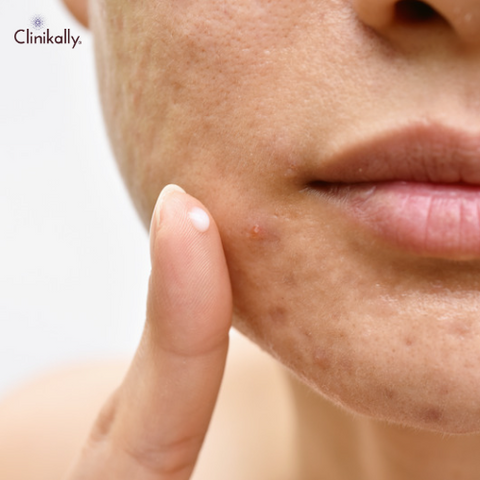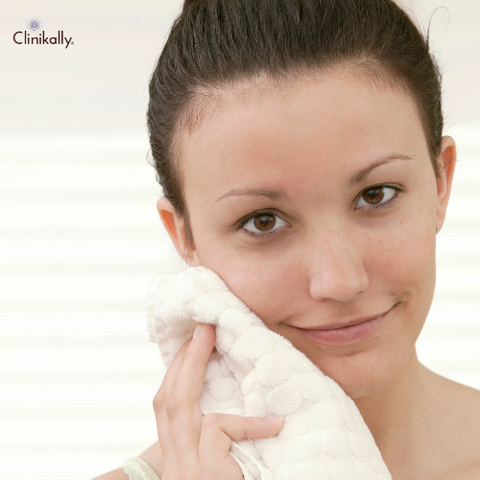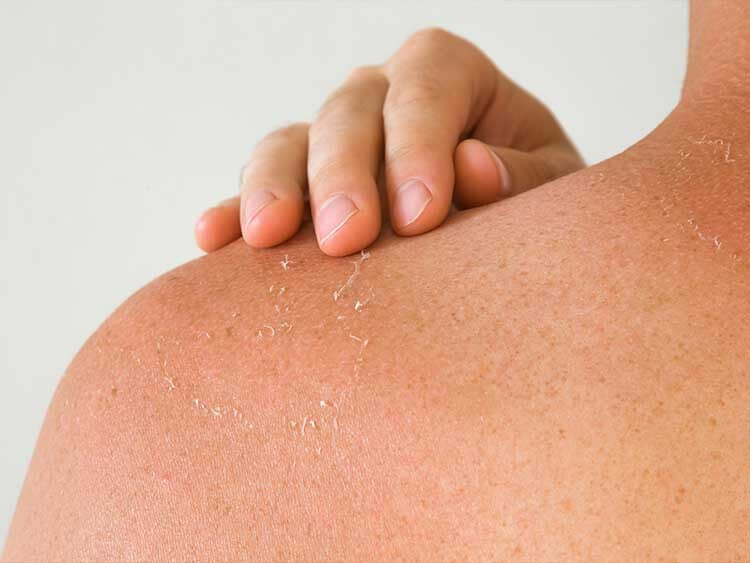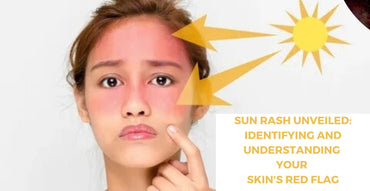Our skin plays a vital role in protecting our body from external factors and maintaining our overall well-being. However, many of us struggle with various skin issues that can negatively impact our self-esteem and quality of life. Understanding the causes of unhealthy skin is crucial in order to address these issues effectively. In this blog, we will explore the top causes of unhealthy skin and provide practical tips on how to address them. Whether you're dealing with acne, dryness, or sensitivity, this guide will help you achieve healthier, more radiant skin.
Understanding the Causes of Unhealthy Skin

Our skin is affected by a multitude of factors, ranging from external influences to internal imbalances. By recognizing and addressing these causes, we can take proactive steps toward healthier skin.
Environmental Factors that Affect Skin Health
Environmental factors have a significant impact on the health of our skin. Exposure to harsh weather conditions, air pollution, and harmful UV rays can lead to various skin problems. Prolonged sun exposure, for example, can accelerate the aging process, cause sunburns, and increase the risk of skin cancer. Similarly, pollution particles can clog pores, leading to acne breakouts and a dull complexion.
To address these environmental factors, it is important to protect your skin. Use sunscreen with a high SPF, wear protective clothing, and seek shade during peak sun hours. Additionally, cleanse your skin thoroughly every day to remove pollutants and maintain its health.
Lifestyle Habits that Can Contribute to Unhealthy Skin
Our lifestyle choices can significantly impact the health of our skin. Poor diet, lack of sleep, excessive alcohol consumption, and smoking can all contribute to skin problems. Consuming a diet high in processed foods, sugar, and unhealthy fats can lead to inflammation and breakouts. Inadequate sleep disrupts the skin's natural repair processes, resulting in a dull and tired complexion. Alcohol and smoking can dehydrate the skin, cause premature aging, and worsen conditions like rosacea.
To promote healthier skin, adopt a balanced diet rich in fruits, vegetables, whole grains, and lean proteins. Ensure you get enough sleep each night and limit your alcohol intake. Quitting smoking not only benefits your overall health but also improves the appearance and vitality of your skin.
Hormonal Changes and Skin Health
Hormonal changes can have a profound impact on the health of our skin. Fluctuations in hormone levels, particularly during puberty, menstruation, pregnancy, and menopause, can lead to acne breakouts, oily skin, or dryness. Hormonal imbalances can disrupt the skin's natural oil production, resulting in various skin concerns.
To address hormonal skin issues, it is essential to maintain a consistent skincare routine and seek specialized treatments if necessary. Gentle cleansing, exfoliating, and moisturizing are key steps in managing hormonal acne and balancing the skin. Consulting a dermatologist or healthcare professional can provide valuable guidance in addressing hormonal imbalances and their effects on the skin.
The Role of Genetics in Skin Health
Genetics also play a role in determining our skin health and susceptibility to certain conditions. Some individuals may be more prone to acne, eczema, psoriasis, or other skin issues due to their genetic makeup. While we cannot change our genes, understanding our skin's predispositions can help us make informed choices and develop effective skincare routines.
If you have a family history of specific skin conditions, it is important to be proactive in caring for your skin. This may involve using targeted skincare products, avoiding triggers that worsen certain conditions, and seeking professional advice to manage genetic skin concerns effectively.
Common Skin Conditions Caused by Unhealthy Skin

Unhealthy skin can give rise to a variety of common skin conditions that can be both physically uncomfortable and emotionally distressing. By understanding these conditions, we can take appropriate steps to address them and promote healthier skin.
Acne and Unhealthy Skin
Acne is one of the most prevalent skin conditions, affecting people of all ages. It occurs when the hair follicles become clogged with oil, dead skin cells, and bacteria, leading to the formation of pimples, blackheads, or whiteheads. Unhealthy skin, characterized by excessive oil production, inflammation, and bacterial overgrowth, can contribute to the development and worsening of acne.
To address acne, it is crucial to establish a consistent skincare routine that includes gentle cleansing, exfoliation, and the use of non-comedogenic (non-pore-clogging) products. Additionally, incorporating topical treatments containing ingredients such as salicylic acid or benzoyl peroxide can help reduce acne-causing bacteria and inflammation. In severe cases, dermatological interventions like prescription medications or professional treatments may be necessary.
Eczema and Unhealthy Skin
Eczema, or atopic dermatitis, is a chronic inflammatory skin condition characterized by dry, itchy, and inflamed patches of skin. Unhealthy skin that lacks proper moisture and a compromised skin barrier function can contribute to the development and exacerbation of eczema. Environmental factors, allergies, and genetic predisposition also play a role in this condition.
To address eczema, it is essential to keep the skin hydrated and moisturized. Regular application of emollients and moisturizers can help repair the skin barrier and alleviate symptoms. Avoiding triggers such as harsh detergents, fragrances, and excessive heat or cold can also help manage eczema flare-ups. In more severe cases, prescription medications and topical corticosteroids may be prescribed by a dermatologist.
Psoriasis and Unhealthy Skin
Psoriasis is a chronic autoimmune condition that causes the rapid build-up of skin cells, resulting in thick, red, and scaly patches. Although the exact cause of psoriasis is unknown, unhealthy skin, stress, genetics, and immune system dysfunction are believed to contribute to its development and flare-ups.
Addressing psoriasis involves a combination of strategies to manage symptoms and promote skin health. Regular moisturization and gentle exfoliation can help alleviate dryness and reduce scaling. Topical treatments containing ingredients like corticosteroids, vitamin D analogs, or retinoids can be prescribed by a dermatologist to manage inflammation. In some cases, phototherapy or systemic medications may be recommended to control more severe forms of psoriasis.
Rosacea and Unhealthy Skin
Rosacea is a chronic inflammatory skin condition characterized by facial redness, flushing, visible blood vessels, and sometimes, small bumps or pimples. Unhealthy skin, sun exposure, hot and spicy foods, alcohol, and certain skincare products can trigger or exacerbate rosacea symptoms.
To address rosacea, it is important to adopt a gentle skincare routine that minimizes irritation. Using mild, fragrance-free products and avoiding harsh exfoliants or astringents can help manage symptoms. Sun protection is crucial, as sun exposure can trigger flare-ups. Dermatologists may also prescribe topical or oral medications to reduce redness and inflammation in more severe cases.
Addressing Unhealthy Skin: Tips and Strategies
Now that we have explored the causes and common skin conditions associated with unhealthy skin, let's delve into practical tips and strategies to address these issues and promote healthier skin.
A Comprehensive Skincare Routine for Healthy Skin
Establishing a consistent skincare routine tailored to your skin type and concerns is fundamental for maintaining healthy skin. Here are some key steps to include in your daily skincare routine:
-
Cleansing: Start by cleansing your face twice a day, morning and night, to remove dirt, oil, and impurities. Choose a gentle cleanser that suits your skin type and avoid harsh scrubbing, as it can damage the skin barrier.
-
Exfoliation: Exfoliate your skin once or twice a week to remove dead skin cells and promote cell turnover. Use a gentle exfoliator or chemical exfoliants containing alpha-hydroxy acids (AHAs) or beta-hydroxy acids (BHAs). However, be cautious not to over-exfoliate, as it can lead to irritation and dryness.
-
Moisturization: Hydrate your skin by applying a suitable moisturizer after cleansing. Moisturizers help to lock in moisture, maintain the skin's natural barrier function, and prevent dryness. Choose a moisturizer that suits your skin type, whether you have oily, dry, or combination skin.
-
Sun Protection: Protect your skin from harmful UV rays by applying sunscreen with a broad-spectrum SPF of 30 or higher. Sunscreen should be used every day, even during cloudy or winter days, as UV rays can penetrate through clouds and cause damage to the skin. Reapply sunscreen every two hours, especially if you're exposed to the sun for extended periods.
-
Targeted Treatments: If you have specific skin concerns such as acne, hyperpigmentation, or aging, incorporate targeted treatments into your routine. These may include serums, spot treatments, or creams containing ingredients like retinol, vitamin C, hyaluronic acid, or niacinamide. Consult a dermatologist or skincare professional to determine the most suitable treatments for your skin concerns.
Diet and Lifestyle Changes to Promote Skin Health
In addition to a proper skincare routine, making certain diet and lifestyle changes can significantly improve the health of your skin:
-
Eat a Balanced Diet: Opt for a diet rich in fruits, vegetables, whole grains, lean proteins, and healthy fats. These nutrient-dense foods provide essential vitamins, minerals, and antioxidants that promote skin health and repair.
-
Stay Hydrated: Drink an adequate amount of water throughout the day to keep your skin hydrated and flush out toxins. Proper hydration contributes to a plump, radiant complexion.
-
Manage Stress: Chronic stress can contribute to skin issues like acne, eczema, and psoriasis. Practice stress management techniques such as meditation, deep breathing exercises, yoga, or engaging in hobbies that help you relax.
-
Get Sufficient Sleep: Aim for 7-8 hours of quality sleep each night. During sleep, the skin undergoes repair and rejuvenation processes, which are crucial for healthy skin. Lack of sleep can lead to dullness, fine lines, and increased susceptibility to skin problems.
-
Avoid Smoking and Excessive Alcohol Consumption: Smoking accelerates aging, reduces collagen production, and impairs blood circulation, leading to unhealthy skin. Similarly, excessive alcohol consumption can dehydrate the skin and worsen conditions like rosacea. Quit smoking and limit alcohol intake for the sake of your skin's health.
Professional Skincare Advice for Addressing Unhealthy Skin
While following a consistent skincare routine and making lifestyle changes can significantly improve the health of your skin, there may be instances where professional advice is necessary. Here are a few reasons to seek the guidance of a skincare professional:
-
Persistent or Severe Skin Issues: If you've tried various home remedies and over-the-counter products without success, it may be time to consult a dermatologist or esthetician. They can assess your skin condition and provide targeted treatments or prescription medications, if needed.
-
Customized Skincare Recommendations: A skincare professional can analyze your skin type, assess your specific concerns, and recommend products and treatments tailored to your needs. They can help you choose the right ingredients, formulations, and routines to address your skin issues effectively.
-
Professional Treatments: Skincare professionals offer a range of treatments such as chemical peels, microdermabrasion, laser therapy, or light-based therapies that can help improve the health and appearance of your skin. These treatments can target specific concerns like acne scars, hyperpigmentation, or signs of aging.
-
Guidance for Skin Conditions: If you have chronic skin conditions like eczema, psoriasis, or rosacea, a dermatologist can provide specialized advice and treatment options to manage and alleviate your symptoms. They can monitor your condition, adjust your treatment plan as needed, and provide valuable support throughout your skincare journey.
-
Early Detection of Skin Cancer: Regular skin examinations by a dermatologist are crucial for the early detection of skin cancer. They can identify suspicious moles or lesions and recommend appropriate steps for further evaluation or treatment, ensuring the health and safety of your skin.
Conclusion
Achieving healthy skin involves understanding the various causes of unhealthy skin and implementing effective strategies to address them. By considering environmental factors, adopting healthy lifestyle habits, and seeking professional advice when needed, you can improve the health and appearance of your skin. Remember, consistency is key in skincare, so maintain a regular routine, be patient with the results, and embrace a holistic approach to nurture your skin. With proper care and attention, you can enjoy healthier, more radiant skin and boost your self-confidence in the process.















